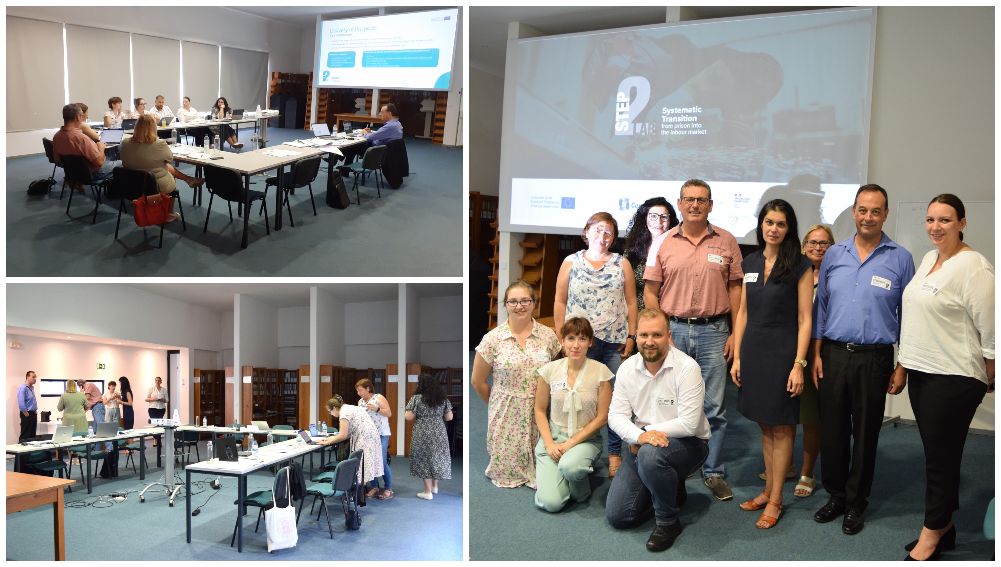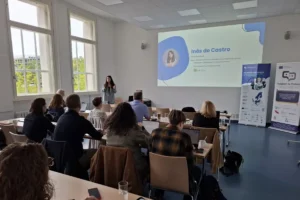Representatives from prison institutions, industry, and professional development experts gathered to align their strategy going forward on a transnational project supporting (ex)-inmates’ employability and reintegration.
When released, most prisoners desire to find and retain a legitimate, stable, long-term employment opportunity since they need a job after incarceration. However, after being released from jail, most ex-offenders have trouble finding or retaining employment, especially one that offers both stability and good salaries.
Education can work as a gateway to achieving social and economic mobility. However, the prison population is known for having lower formal education than the general adult population.
Education and employment play a particularly important role in inmates’ social reintegration process. The lack of education and prevailing low levels of training makes the social re-adaptation process more challenging and can significantly impact recidivism rates. Acquired credentials and professional expertise increase the inmates’ economic independence while reducing their chance of unemployment.
Many European nations’ penal policies and regulations underscore the importance of prison employment and education for prisoners, as that help enhance inmates’ moral views, ability to reintegrate into society successfully, and sense of self-respect.
Education programmes in prison differ according to country and jurisdiction; yet, almost all European nations currently offer education in at least some of their prisons.
The STEP2LAB project contribution
The STEP2LAB project promotes the professional development of inmates by building their competencies through prison work. This work can be developed in cooperation with prison administrations or specific private industries.
While promoting these programmes next to prison services and private industries in need of human resources, STEP2LAB aims to develop a framework allowing these institutions to independently create effective and collaborative itineraries of socio-labour integration for inmates.
The project seeks to target a younger audience, capacitating and motivating lighter sentences or end-of-sentence individuals to pursue a professional career and follow a sustainable living project. On a first approach, STEP2LAB will reach almost 100inmates and prepare more than 70 trainers actively working in the field throughout six European countries (Portugal, Spain, France, Italy, Romania and Germany).

Know more about this project

STEP2LAB
Systematic Transition from Prison into the Labour Market
STEP2LAB is led by the Portuguese project’s coordinator CENTIMFE (Technological Center for Molds, Special Tools and Plastics Industry).
The remaining consortium members of the STEP2LAB project are IPS_Innovative Prison Systems (Portugal), Mioveni Penitentiary (Romania), Greta du Velay (Velay Region Educational Institutions Group) (France), IRFIP (Religious Institute of Vocational Education and Training – Romania), CIRE (Center for Reintegration Initiatives – Catalonia, Spain), and KIMW-Q (Non-profit KIMW Qualification Association – Germany).
For more information on the STEP2LAB project, please visit its page.
Related projects

VR4React
Reducing Reactive Aggression through Virtual Reality

VR4DRUG Rehab
Developing and Using Virtual Reality Technology for the Rehabilitation of Drug Users in Probation Services

VISION
Visualising the Future Through Training

ViRTI
Virtual reality for training inmates

Turning Blue
Integrating Young Offenders Through the Blue Economy

TRIANGLE
Secured digital education system for vocational skills for youngsters in closed institutions

TRAIVR
Training of Refugee Offenders by Virtual Reality

SPORT4PRISONS
New sports method for prisons as a tool to support competency development, positive values, and reintegration

RE[ENTER]
Strengthening the capacity of criminal justice professionals and volunteers

Probationet
A flexible, multidisciplinary and transnational VET model for the PROBATION services and practitioners
Related news

IPS showcases virtual reality solutions for skills development and stress management at Berlin workshop
Read More »
IN2PREV Final Conference highlights cross-sector collaboration for refugee inclusion and radicalisation prevention
Read More »
JUSTICE TRENDS Magazine Launches 14th Edition: Expanding the Frontiers of Rehabilitation Support
Read More »





